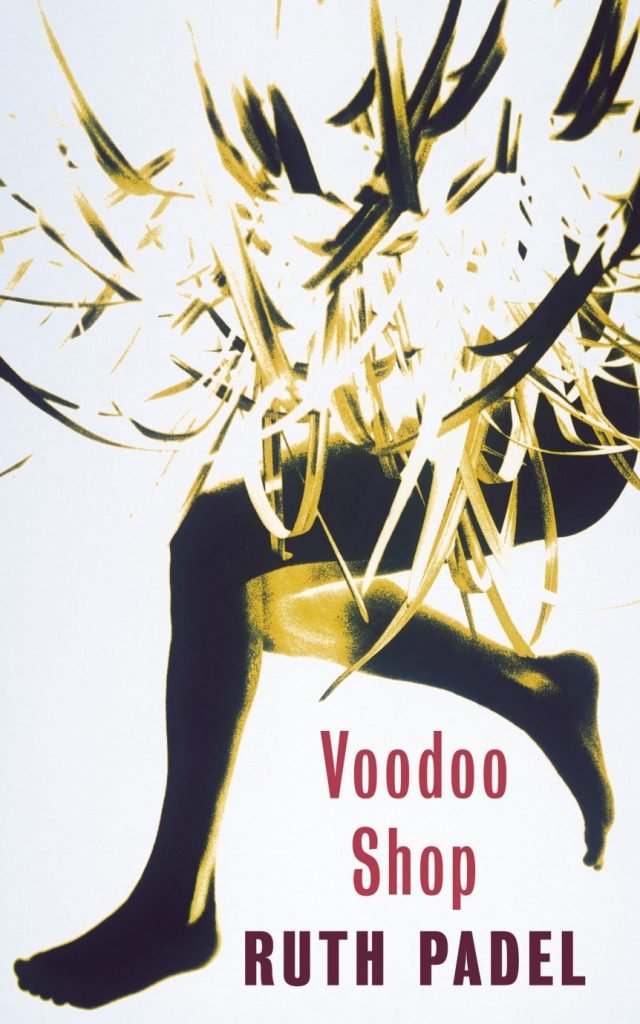Voodoo Shop
A twenty-first century tale of love and bereavement, shortlisted for Whitbread and T. S. Eliot Prizes 2002
Voodoo Shop includes many of Ruth Padel’s lyric arias, such as ‘Writing to Onegin,’ which the Times Literary Supplement called a ‘startling poem filled with extravagance, a marvellous example of imitation as originality, defying Pushkin’s model yet remaining true to his heroine’s psychology;’ and ‘Rubies and Rattlesnakes,’ shortlisted for 2000 Forward Prize Best Poem.
Beginning with a love letter from an opera, ending with a haunting valedictory meditation on migration, Voodoo Shop stages a series of journey across the globe while continuing to explore a theme begun in Rembrandt Would Have Loved You, the image of the female artist.
The poems are separate dramatic scenarios with a strikingly varied cast of characters: Tori Amos chooses a piano in Vienna, Bridget Riley argues about art in a Venetian piazza. But together they suggest a single story of lovers who sustain each other through the deaths of their parents, and then part.
From the reviews
‘I love Ruth Padel’s poetry. She is sexy, strong, rhythmic, passionate, fully alive and a whiz with words.’ Jeanette Winterson, The Times
‘Colloquial and beautifully cadenced, popular and vibrant: her techniques are rich and rewarding – the poems slink down the page demanding to be read aloud. The glamour recalls Sex and the City: this alone would make her voice an original one. Her poetry adds dash and a palette of vivid colours to the pastel tones and staid demeanour of much British verse.’ Stephen Knight, Independent on Sunday
‘Visual, sensuous, inventive and highly seductive – as if Wallace Stevens had hijacked Sylvia Plath with a dash of punk Sappho thrown in. A language lush and bold, exotic as well as erotic. Deftly evoked scenarios, and the skill with which she handles the speaking voice, make for a vibrant collection.’ Times Literary Supplement
‘Sensuous slangy riffs unfurl across expansive 12-line stanzas. Her cinematic technique is humorous, tender, flamboyant and unforgettable.’ The Independent
‘Approachable, contemporary and cool, with all the elements of everyday life: telephones, films, holiday resorts, Nikes. The language, modest and simple, baroque or intimate, is magnificently varied. The form, daring and imaginative, creates an exuberant rhythm never short of glittering humour. A very sexy book, fabulously rich.’ What’s On
‘Poems of travel in exotic places of the globe and of the human heart. The rhythms swoop and soar: Padel’s technique is assured and she displays a gift for modulating from easy conversational to a more richly textured singing line with no sense of dislocation.’ Vernon Scannell, Daily Telegraph
‘A voice of great authority and integrity; poems that flow and sparkle.’ Belfast Telegraph
‘Padel’s opulent passionate flights of fancy are touched by myth and dream but her characters’ sweaty desires, anger and laughter fully inhabit the here and now.’ The Metro
‘For the uninitiated, an easy and fulfilling introduction to poetry; for the fan, a glorious work of intricate detail, expansive scale. Accessible, beautifully constructed, hugely entertaining with an access point for any reader, it is a poetic love story taking in everything from cosmic musings on dark stars to the piano-buying of Tori Amos. On their own, the poems are funny, touching, deeply moving. Together, they take the reader on a magical journey.’ virginstudent.com
‘A sumptuous tapestry of invention and linguistic ornament, the richly clothed vocabulary surprised and punctured by the vernacular,’ Danny Abse, Hampstead & Highgate Express
‘Poems like a collection of polished gems, language driven as far as it can go and worth the effort. A sense of tightrope-walking, boundaries pushed out, stretching thought and structure. Deeply exhilerating as well as moving,’ Mslexia
‘A daughter’s book, risky and virtuoso: poems on fire with nervous energy. Despite the trademark sophistication, glitter, ease with which she moves between registers, polish and persuasive rhythms, there is a surprisingly girlish quality here, in this poet-as-woman-of-the-world. This book is very much a daughter’s book. In the central poems the significant theme is death.” Leonie Rushforth, London Magazine
‘In Voodoo Shop, Ruth Padel’s poems travel across the globe, through the years, between generations, crossing frontiers between inner and outer realms, the human and the cosmic. Padel’s writing is often described as sexy, but in this volume she seldom lingers on the body. There are two brief filmic acts of lovemaking, one on a kitchen table, the other on a pebbly beach. There is also a passionate letter to Eugene Onegin. Always, though, sensual overtones play abundantly around the poet’s radar, alert to everything from ‘rowdy ripples of cranberry vinegar’ in a delicatessen window to ‘soft sapphire dusk’ on Copacabana Beach. where boys play ‘manic soccer … To an audience of rearing, floodlit, diamond surf.’ There are intimacies on every page. In ‘A Lick and a Promise,’ Padel brings us into the lovers’ bathroom to show us a shaving stick, with its ‘heartline-friendly handle’ and splay of bristles that
… polar-bear your cheekbones every morning.
Abandoned on our New
York basin’s luxury mauve lip
As if you’d gone to Washington for a day,
A week, a year, and when you’re back
Might kiss me through
Fine flowing handlebars. A Father Christmas leer.
Typical here are the fleeting irony of ‘luxury,’ the restless shifting through gears of time, the ‘year” / “leer’ slant-rhyme half-found, half-made, and the anticipated homecoming which manages to be at once, wittily surreal and embarrassingly plausible.
The last poem in the collection, ‘Casablanca and the Children of the Storm.’ is a tour de force in which Padel shows just how wildly digressive she can be without for a moment losing her grip on the main theme, the end of a six-year affair. In the closing lines, this is beautifully assayed as an alloy of “magnetism” and “faith”. Nor is love her only subject. She is also a moving elegist. Padel shows palpably that sexual love and familial grief spring from the same psychic soil.’ Poetry Review
